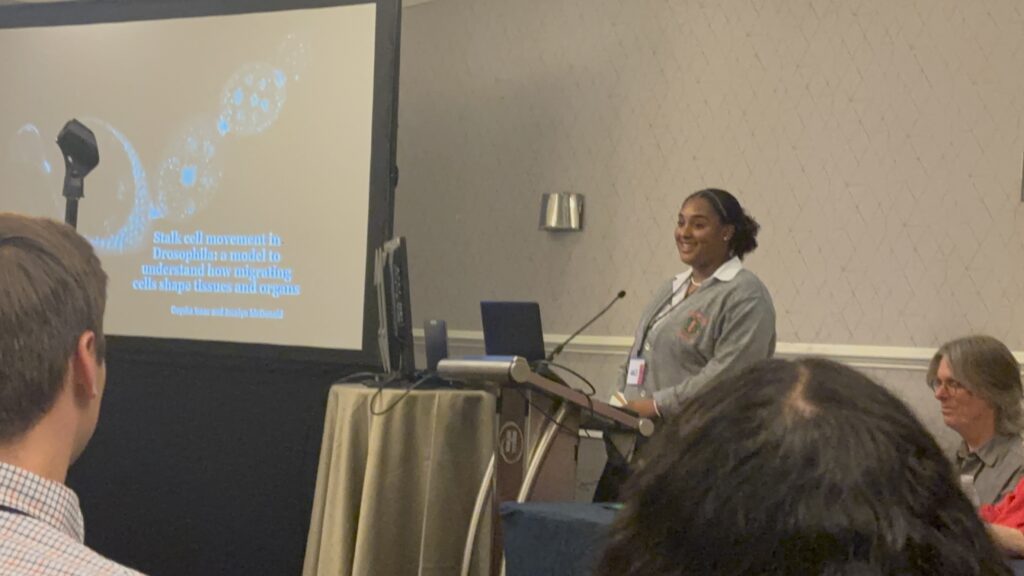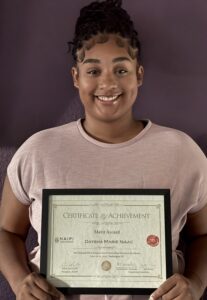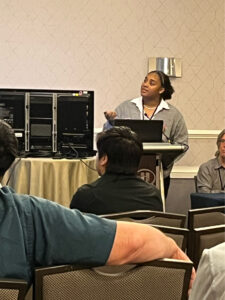Biology senior earns scientific merit award at national conference

by Ellie Melero, Media Relations Specialist
Biology senior Daysha Isaac won a Scientific Merit Award at the National IDeA Symposium of Biomedical Research Excellence (NISBRE) Conference in Washington D.C. this summer.
The 9th Biennial NISBRE Conference, put on by the National Institute of General Medical Sciences (NIGMS) from June 16-19, was a showcase of the accomplishments of the NIGMS’s IDeA program. Undergraduate and graduate students, postdoctoral fellows, junior and senior investigators, and staff from IDeA-supported programs came together to share their research. At the conference’s end, various awards were presented, including merit awards, mentorship awards, and entrepreneurship awards.
“I used to be a student who struggled with education and could barely understand the concept, to now being a student who can properly explain a complex topic to a plethora of people,” Isaac said. “So this award means that no matter what obstacles are thrown my way, I am able to grow past them.”
A native of Arlington, Texas, Isaac has been interested in biology and medicine since she was a child. She was born with an umbilical hernia that had to be removed when she was 8, and her time in the hospital gave her an insight into what a life in medicine was like. Since then, she has worked toward her goal of becoming a doctor, and she aspires to be a pediatrician or a neonatal physician.

Isaac came to Langston University looking for a place where she could thrive with individuals who looked like her and had the same aspirations as her, and she has found a supportive community that has helped her grow as a person and a scholar.
“Being an African American in a field that is not as diverse means I have to work extremely hard to spread my name across the room,” Isaac said. “Therefore, when professors see my talent, it makes me grateful for all my hard work. It excites me when others see my potential and are able to help me network. It motivates me when I am able to expand my name across a plethora of audiences.”
Isaac’s foray into research began when she met Dr. Kj Abraham in his Honors Natural Science Biology-I class. She impressed him with her eagerness to learn, and he has been her faculty mentor for the past two years.
As a faculty mentor, Dr. Abraham introduces students like Isaac to biomedical research and helps prepare them for a career in biomedical sciences. He trains them in research techniques, teaches them fundamentals in research and helps them to build technical skills. They are also prepared to work independently on research projects. They are taught how to review research publications, write research abstracts, and make oral presentations.
Dr. Abraham introduced Isaac to the Kansas IDeA Network of Biomedical Research Excellence (K-INBRE) last year, and he said he is proud to see how much she has grown through her participation in the program.
“She was quick to learn and follows instructions very well,” Dr. Abraham said. “She was committed to her task and adapted very well to undergraduate research. Her growth was evident in the way she successfully completed her research internship at KSU and went on to win a poster prize at the Annual K-INBRE Symposium in January.”
Through K-INBRE, Isaac worked with Dr. Jocelyn McDonald at Kansas State University to do research on stalk cell movement in drosophila. She studied ovarioles in fruit fly ovaries and looked at several functions, including cell formation and the movement of stalk cells, and then marked the differences when mutations were added.
“This information allowed us to apply it to birth defects in infants,” Isaac said. “No way are we trying to cure it but gather more information about cell movement to make a connection. Such birth defects we compared it to were spina bifida and microcephaly.”

Isaac presented this research at the K-INBRE Symposium in January, where she won an Award of Excellence in Poster Presentations, and was invited to present again at the NISBRE Conference. This time, she gave an oral presentation in addition to the poster presentation.
Isaac said she was nervous for her oral presentation, but she fought through her nerves to deliver an engaging presentation with energy and excitement. She was proud of her performance, and for good reason.
“After I presented, I was complimented many times,” Isaac said. “I was told by a professor that when I was ready to apply to graduate school to contact him, and another professor said he would want me to consider attending their medical school in Maine. I was told I brought the energy to the room, and I presented my research very well. Even with all the compliments, I still was extremely surprised that I won an award.”
Dr. Abraham said Isaac’s presentation was outstanding and that her confidence and knowledge were evident. He was not as surprised as Isaac that she won the Scientific Merit Award.
“This award shows that students from LU can be the best in the country and have proved that they can be top prize winners provided they are mentored and given opportunities,” Dr. Abraham said. “This also means that LU is on the national map in biomedical research.”
Isaac plans to continue being involved in research during her last year at Dear Langston, and she plans to apply for graduate school after graduation. She eventually plans to go to medical school.




